In reality, emotionally healthy single parents do a pretty good job of raising healthy, well-adjusted kids. Most kids of single parents turn out fine. In contrast, when a married two-parent home is unsafe and toxic, the children are exposed to destructive, harmful behavior during their developmental years. The results can be tragic.
Please don’t misunderstand what I am saying. I am a devout Christian and I believe in the sanctity of marriage. I believe God meant marriage to be loving, undefiled, and lifelong. I’m no proponent of the “I’m bored” divorce, or “I miss the party life” divorce, or “I feel unfulfilled” divorce. Nor do I think people should give up in the face of normal marriage problems.
But we are not talking about normal marriages. We are talking about marriages that are unsafe. We’re talking about marriages with serious problems, such as a pattern of infidelity, sexual immorality, physical abuse, chronic emotional abuse, abandonment or severe addictions. These problems account for half of divorces in the U.S. These are relationships with “marriage-endangering” sins, not normal run-of-the-mill sins. We’re talking about the big sins that destroy marriages.
These are not the good or even so-so two-parent married homes. These are destructive homes where the beleaguered spouse feels betrayed, gets angry, and lashes out, but due to religious pressure they cover for their spouse, put on a brave face, pray harder, forgive over and over, and excuse the other spouse’s bad behavior because they’ve been taught to “not let the sun go down on your anger.” They may conceal it from outsiders, but they aren’t fooling the kids. The kids may be too young know the details; they may have been shielded from the truth; they may not have words for what’s happening. But they sense it.
These bad marriages have real, long-term negative effects on kids’ emotional well-being. Researchers compared the outcomes of two groups of adults who were brought up in destructive homes: those whose parents divorced versus those whose parents stayed. They discovered that the kids whose parents divorced had much better well-being on average.
A peaceful, single-parent home or stepparent home is a good choice over a high-conflict two-parent home. Below you will see the studies on kids of divorce. You’ll be surprised at how well they turn out. They aren’t likely to be “seriously troubled.” They aren’t likely to abuse drugs or alcohol. They aren’t likely to get suspended or expelled from school, and they aren’t likely to get divorced themselves.
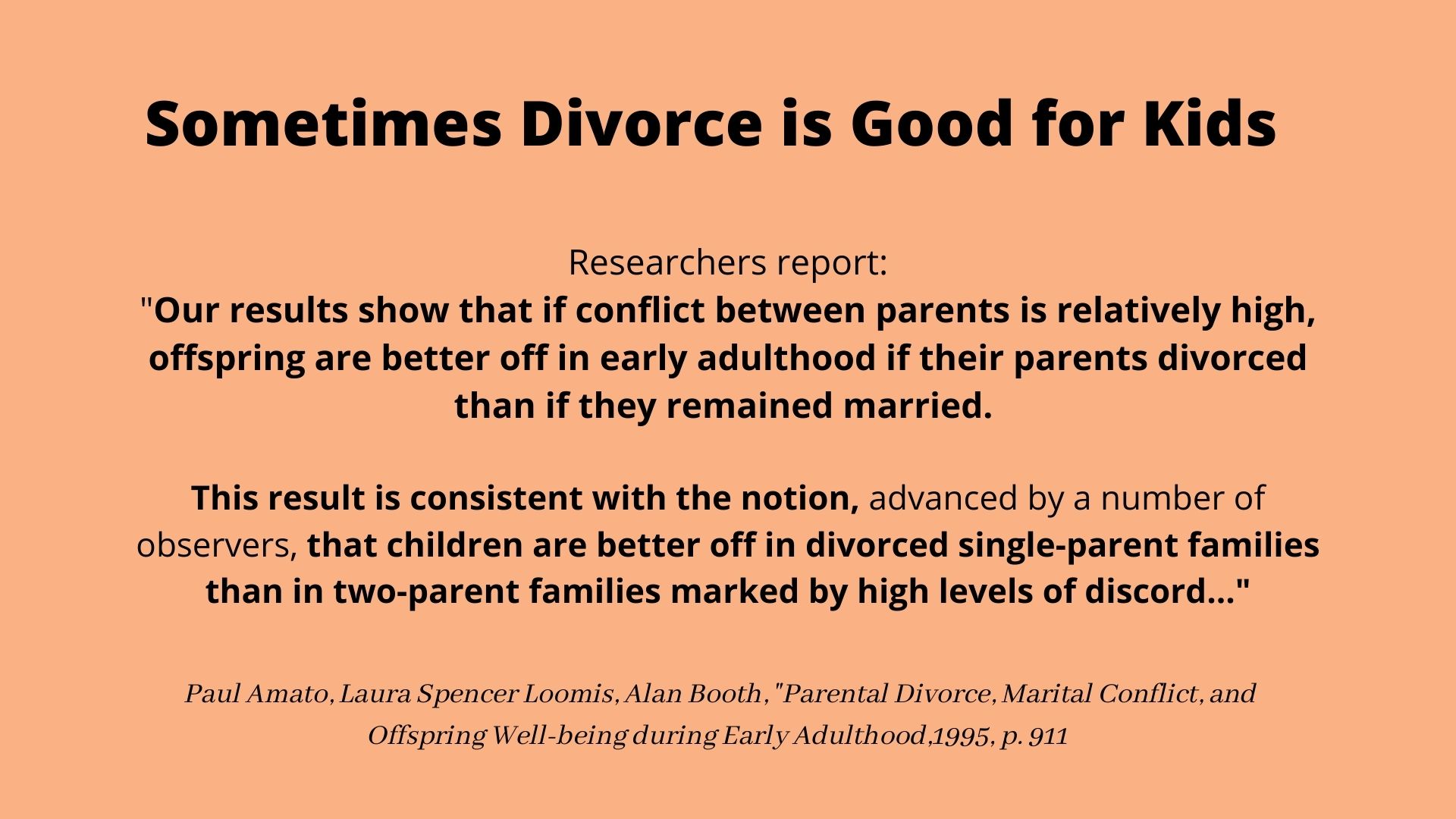
What happens to the kids if you stay in a highly toxic home?
-
-
-
- binge drinking
- using marijuana
- marrying too early
- divorcing
-
-
And it makes sense: If a marriage is full of chaos, and problems don’t get resolved, the children find ways to escape the misery somehow. They may numb themselves with alcohol or drugs or run off to marry the first person who will get them away. If the victimized parent stays in the nightmare, instead of setting boundaries and saying “no” to the abuse and leaving, the children may even develop serious problems such as personality disorders themselves. Kids need to have at least one safe parent who can model good boundaries.
3. Lower Well-being. From 1995 to 2003, researchers analyzed adults who had been brought up in very high-conflict homes. They discovered that offspring whose parents divorced had 10 times better wellbeing than those whose parents stayed together in a very high-discord marriage. (See more about this in the section below: “When Is Divorce Good for Kids?”)
If I Divorce, Will My Children Likely Have Long-Lasting Damage?
About 8 in 10 kids from divorced homes have no serious lifelong problems. While researchers acknowledge that the first two years of the divorce are stressful, most kids bounce back after a few years. Moving, going to a new school, observing legal and personal conflict between parents, and going back and forth between homes does cause real pain for children during the transition, but in the long run, the kids turn out a lot like their friends from two-parent homes.
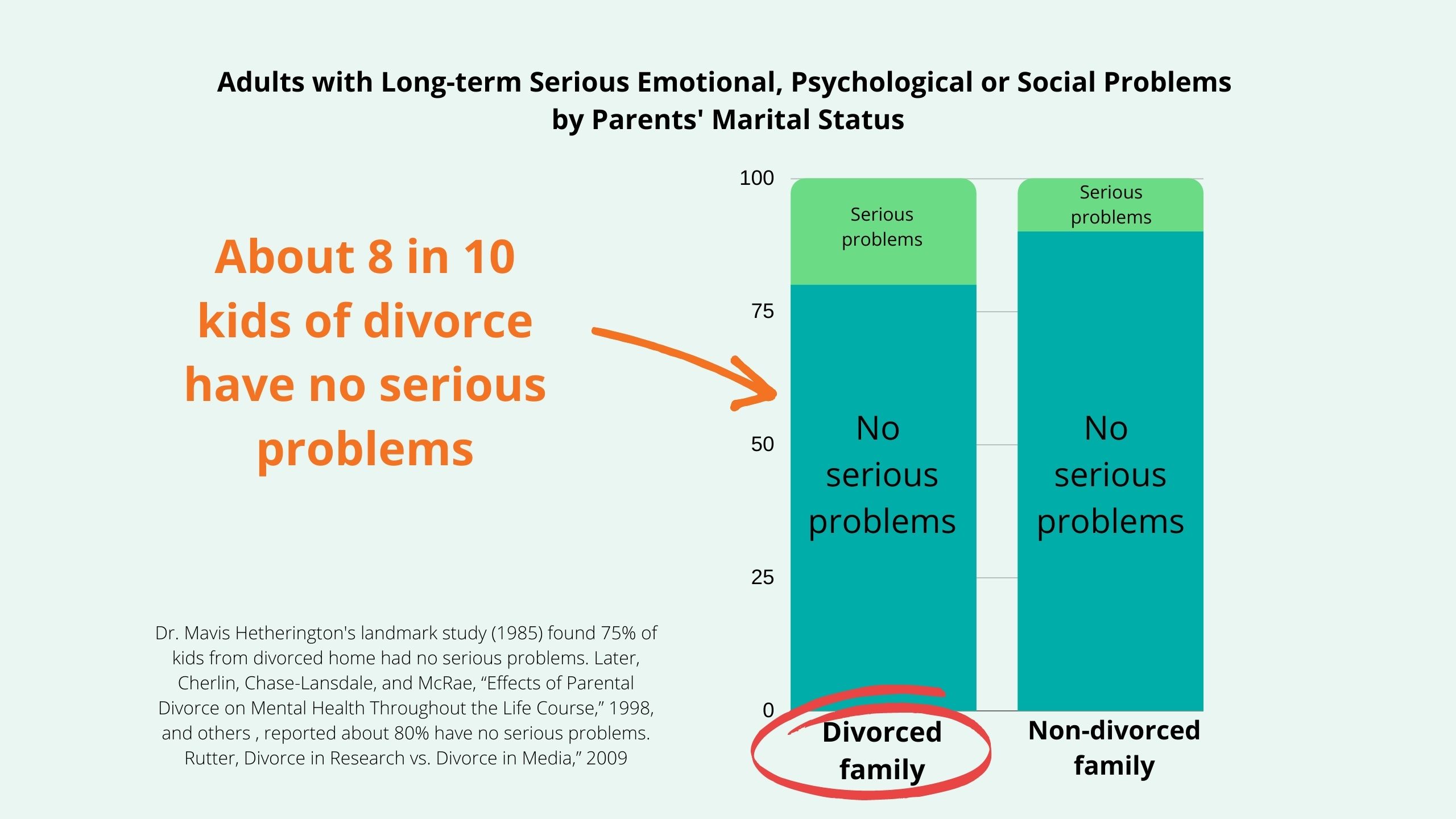
Landmark researcher Dr. Mavis Hetherington (University of Virginia) wrote[6]:
Sociologist Andrew Cherlin (Johns Hopkins University) confirmed Hetherington’s findings but added two bits of information:
- The mental health risk for children of divorce was lower than 25%, ranging between 20% to 25%[7] and later researchers using larger samples, verified the 20% figure.
- Part of the children’s mental health problems existed before the divorce, rather than being caused by the divorce itself.[8] In other words, the toxic environment was already damaging the children many years before the divorce took place.
For people who need a life-saving divorce, this gives hope. And this is why we can say,
If I Divorce, Will My Kids Likely Have Drug and Alcohol Problems?
Your kids are not likely to have alcohol or drug problems. The vast majority of kids in single-parent and stepparent families do not have any substance abuse problems. In fact, the majority of all adolescents don’t have any drug or alcohol abuse problems, no matter what their parents’ marriage was like.
- Only 6 in 100 adolescents in single-mother families had substance abuse problems. 94 in 100 have no substance abuse problems.
- Only 5 in 100 adolescents in two-parent families had substance abuse problems. 95 in 100 have no substance abuse problems.[9]
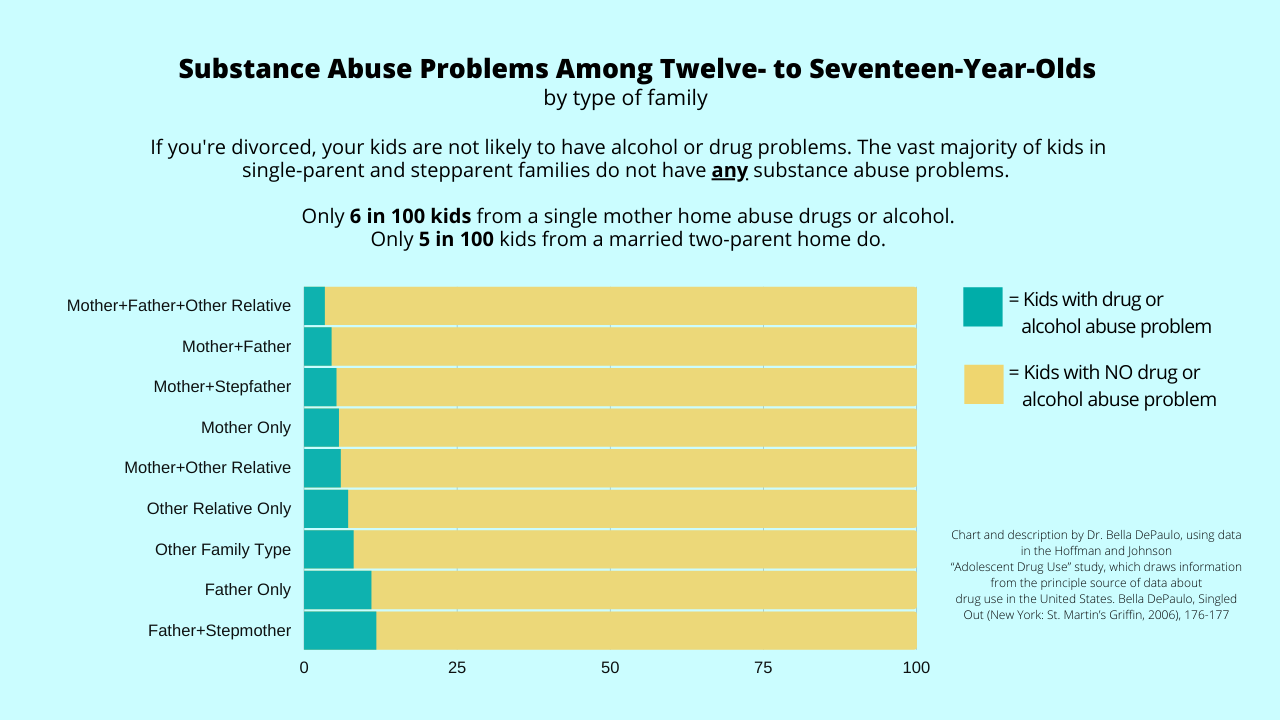
| Substance Abuse Problems Among Twelve- to Seventeen-Year-Olds[9] | |
| Number of kids with abuse problems | Family Type |
| 3.4 in 100 | Mother + father + other relative (Example: grandmother, aunt, etc.) |
| 4.5 in 100 | Mother + father |
| 5.3 in 100 | Mother + stepfather |
| 5.7 in 100 | Mother only |
| 6.0 in 100 | Mother + other relative |
| 7.2 in 100 | Other relative only |
| 8.1 in 100 | Other family type |
| 11 in 100 | Father only |
| 11.8 in 100 | Father + stepmother |
If I Divorce, Will My Kid Likely Have Behavior Problems and Get Expelled From School?
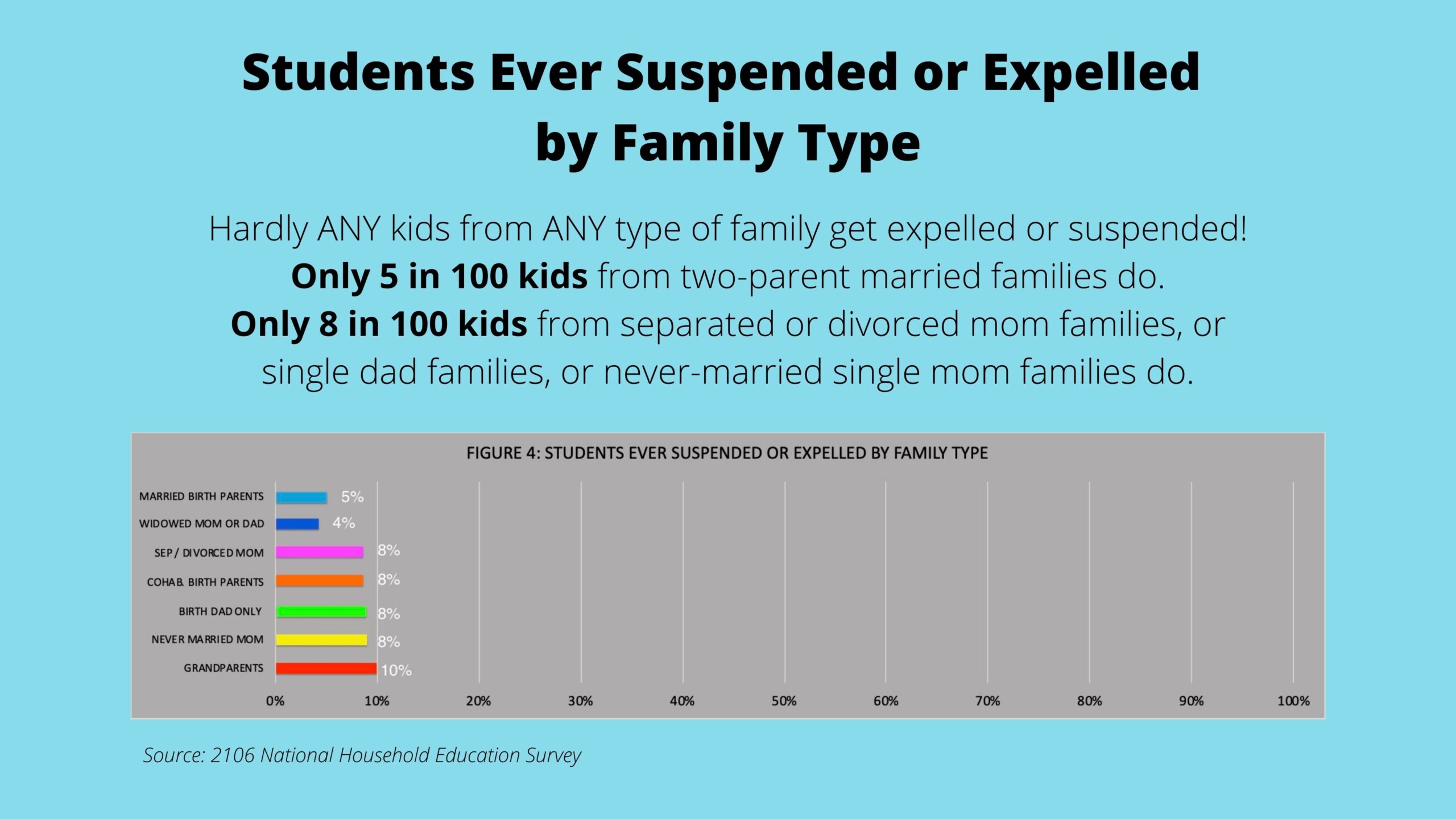
Most adults whose parents divorced do not divorce. The majority of people whose parents divorced have lifelong marriages. However, children from divorced homes are a bit more likely to get divorced than children of married parents.
According to 2018 figures[11]–
-
- Most people who marry never divorce.
- Those people whose parents did divorce have a 47% divorce rate.
- Those people whose parents did not divorce have a 40% divorce rate.
In other words: There’s very little difference between these two groups, only 7%. (7 in 100). The gap, which once was much larger, has narrowed in the past 25 years.
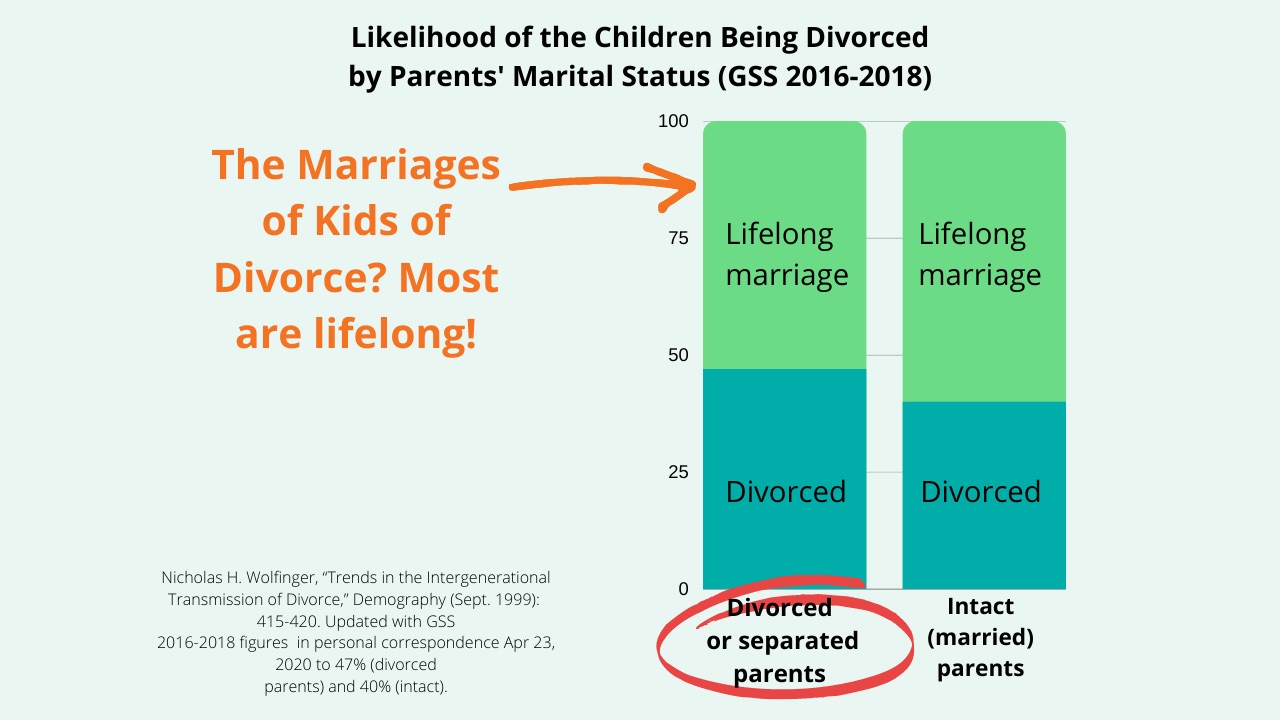
More Good News! If you divorced for a serious reason, chances are that your kids will still have a high view of marital commitment.
If I Divorce, Will It Hurt My Kids to Be Poorer?
Some people think they should stay in a destructive marriage for financial reasons. They say it is better to be in a home with two incomes than one.
But research shows that income makes only a small difference in your children’s outcome. Kids raised in single-parent families with less income have about the same outcome as they would in a deeply troubled two-parent home.[12] In fact, single-parent households have less money for drugs and alcohol, so children are less likely to abuse them.
In other words, household income is not a big factor. If you are staying in an abusive marriage only because you’re worried about money, researchers say lifestyle is not as big a factor as having a safe environment with a nurturing parent.
You and your children may be better off on your own,even if your home is smaller and there’s less money.
- Be loving, warm and close to your children.
- Spend leisure time outside of the home with the kids. (The park, window shopping, sports.)
- Do projects together inside the home.[13]
- Be a fair and consistent disciplinarian.
- Inform children about upcoming changes well in advance.
Yes, single parents can do a good job, especially when they needed a life-saving divorce, a divorce to rescue the kids from trauma.
When is Divorce Good for Kids?
This graph [14] shows five types of marriages that end in divorce. It is a very complex graph, it was done for people with PhD’s, and it shows a lot of information in one diagram. So (below) I’m going to show you my own simple diagram using the same information.
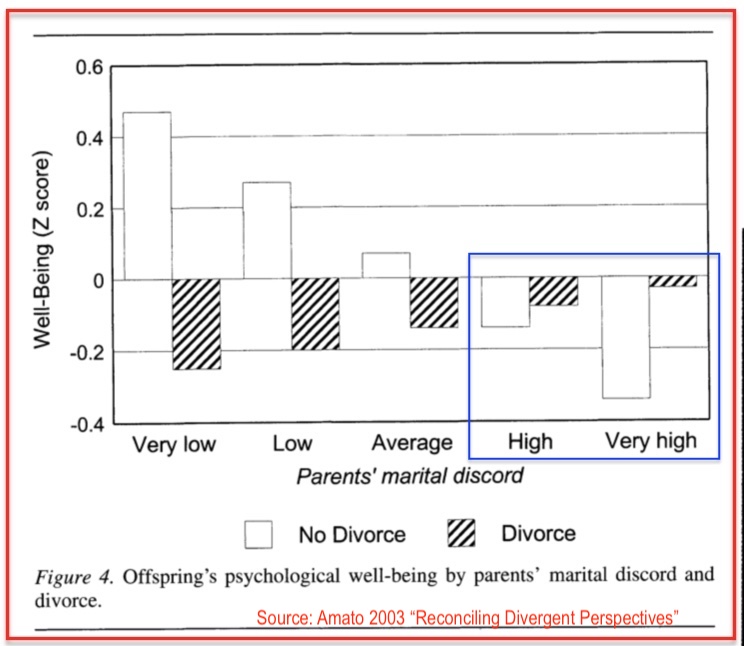
- If the marriage is good or even “okay,” divorce is bad for kids.
- If the marriage is bad or very bad, divorce is good for kids.
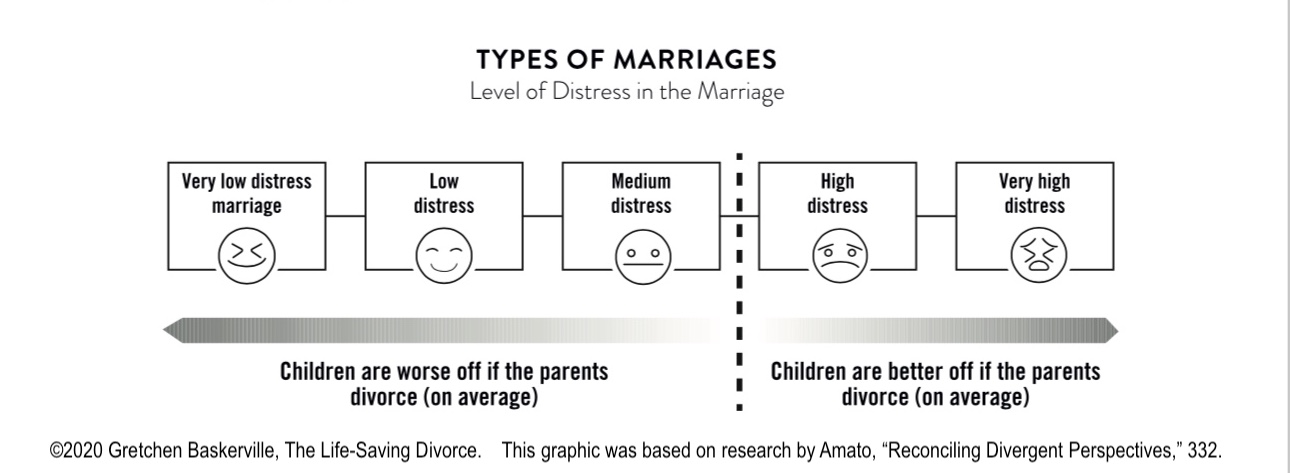
- Very low distress marriages– The couple is able to resolve marital problems. And even though the children sense the stress, they observe genuine apologies, their parents making up, and behavior leading to a better relationship. There’s usually peace and calm in these homes.
- Low distress– Couple resolves most of their problems.
- Medium distress– Couple has some ongoing problems that aren’t resolved.
- High distress– Couple has serious and ongoing problems that don’t get resolved.
- Very high distress– Couple has recurring serious problems that do not get resolved. Family members may feel tense and anxious, trying to keep the next incident from happening. Often they control everything they can, keeping the house perfect or the children quiet, or a million other things to prevent the other spouse from doing something harmful. Sometimes the problems are masked under an air of calm: hidden and covert, with no fighting, screaming, or violence that would be noticed by an outsider. For example, many spouses in these marriages know their marriage isn’t happy, but they cannot put their finger on it. They may feel controlled by the spouse. They may worry about their spouse’s secret behavior. They may walk on eggshells around their mate, even if they’ve never been hit. They sense the marriage is not safe and loving, or even respectful. There may be no fighting, screaming, or overt conflict, but the anxiety and agitation are palpable.
What Does This Graph Show?
It shows that the worse the marriage, the better off the kids will be if you divorce, on average. (And it demonstrates that the reverse is true too: if the marriage is very low conflict and both people are decent and fair-minded and conflicts are actually resolved rather than being swept under the carpet, divorce is really bad for kids.)
What about Kids in Very High-Discord Marriages?
In a very high distress marriage, children were found to be damaged 10 times more if the parents stayed together than if they divorced. (This is my simplified diagram enlarged from the original graph above.)
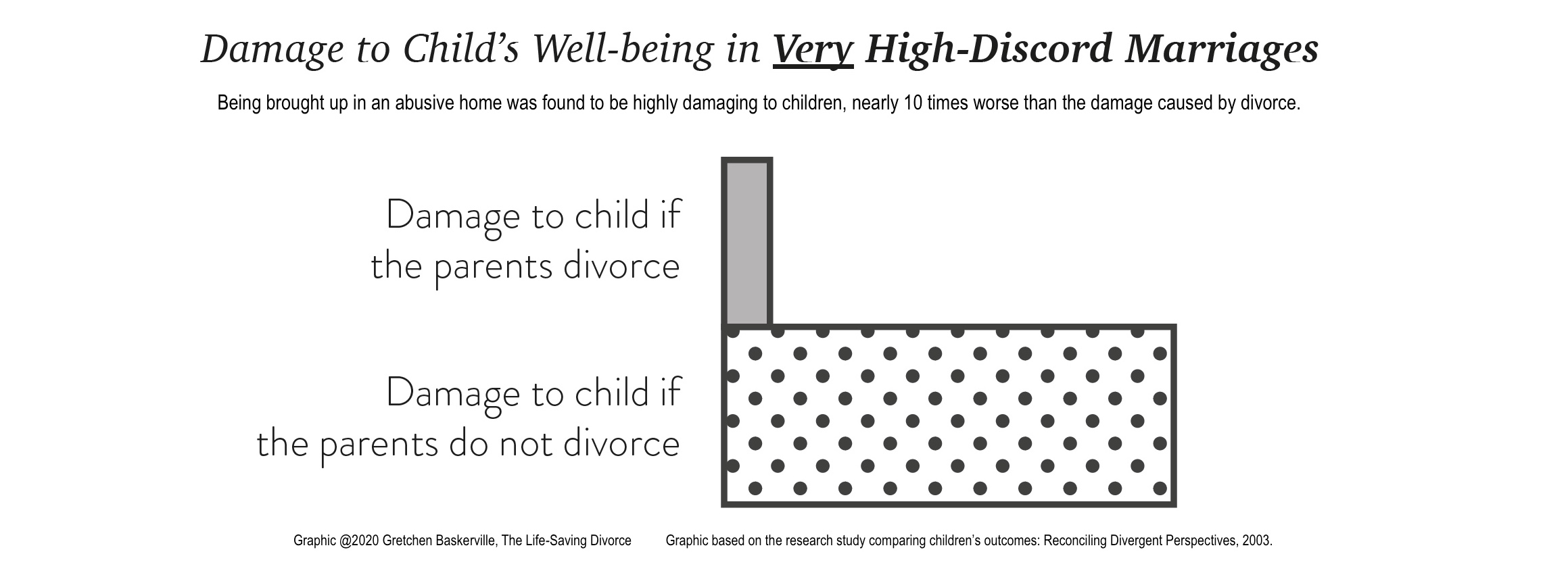
According to this study, even in a high distress marriage (one that is not quite as severe as the very high-discord marriages) the kids were damaged one-and-a-half times more when the parents stayed together rather than divorcing.
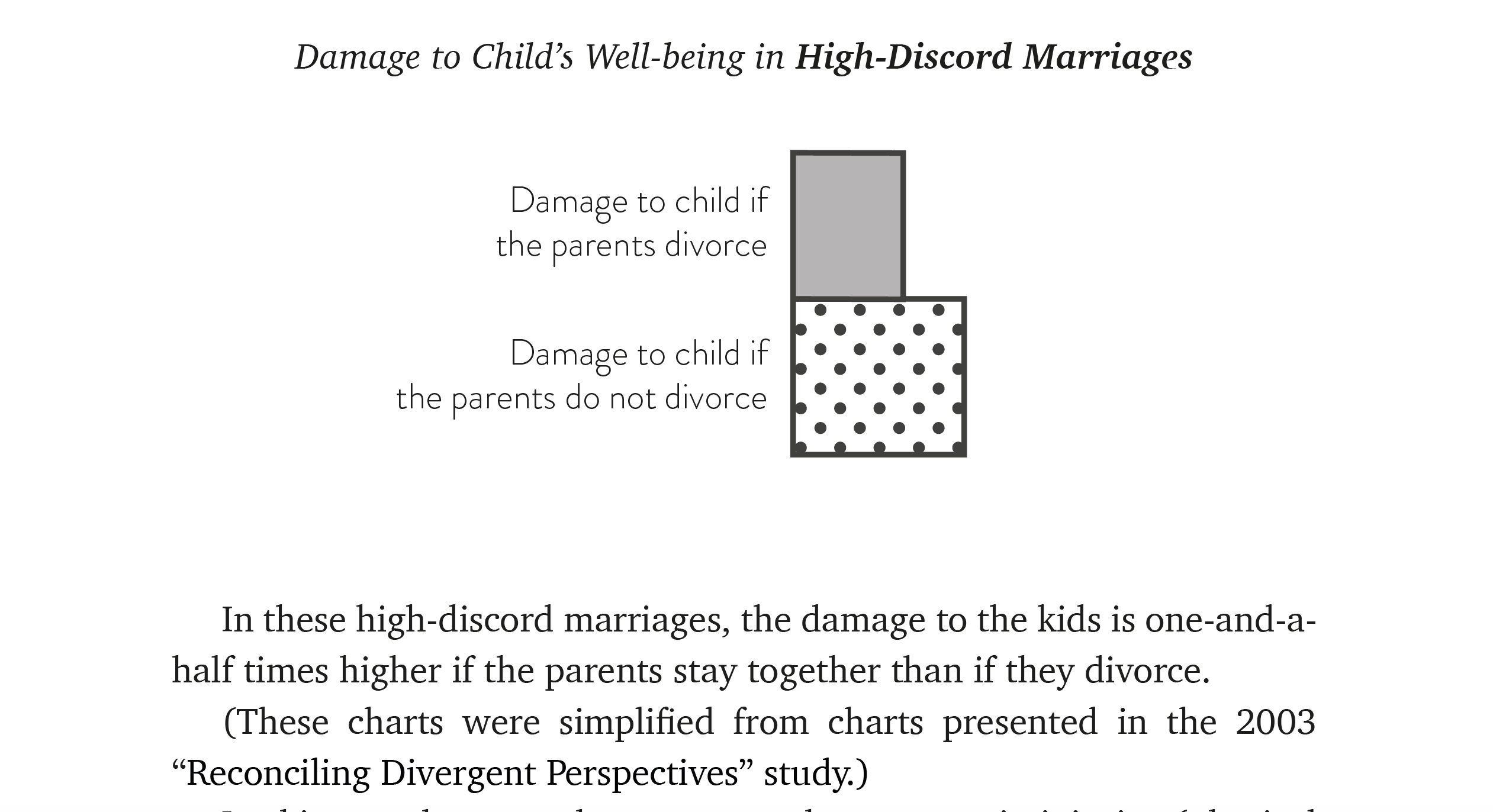
Summary
1. Single parents can do a good job raising kids.
2. Kids from divorced homes do almost as well as kids from two-parent married homes. From a practical standpoint, it may be worth the stress of divorcing to find relief from a highly toxic home.
3. Researchers have known for more than 25 years that divorce is likely best for kids in high distress and very high-distress marriages. (But no one told us that. Why didn’t our pastors, or Christian marriage book authors, or premarital workbooks, or Focus on the Family say something?)
4. Those first two years of the divorce process are tough on kids because of all the changes. For example, moving to a new home, legal conflict between parents, switching schools, worries about the future, and possibly losing friendships. During those early years, kids may blame the divorce on themselves unless the parents help them see they did nothing to cause it. If your child was fine before the divorce, within two years they are likely to go back to normal.
[1] Virginia Rutter, “Divorce in Research vs. Divorce in Media,” Sociology Compass 3, no. 4 (2009): 707-720.
[3] Musick and Meier, “Are both parents always better than one? Parental conflict and young adult well-being. 5 March 2009, page 826.
[4] Paul R. Amato, “Reconciling Divergent Perspectives: Judith Wallerstein, Quantitative Family Research, and Children of Divorce,” Family Relations 52, no. 4 (10/03): 332-339, accessed 03/09/19, https://www. jstor.org/stable/3700314.
[5] Paul Amato, Laura Spencer Loomis, Alan Booth, “Parental Divorce, Marital Conflict, and Offspring Well-being During Early Adulthood,” Social Forces, March 1995, 911.
[6] E. Mavis Hetherington and John Kelly, For Better or For Worse (New York: WW Norton & Company, 2002), 7.
[7] A. J. Cherlin, P. L. Chase-Lansdale, and C. McRae, “Effects of Parental Divorce on Mental Health Throughout the Life Course,” American Sociological Review 63, no. 2 (1998): 239-249, accessed 12/28/19, https://doi.org/10.2307/2657325.
[8] Virginia Rutter, “Divorce in Research vs. Divorce in Media,” Sociology Compass 3, no. 4 (2009): 707-720.
[9] Chart and description by Dr. Bella DePaulo, using data in the Hoffman and Johnson “Adolescent Drug Use” study, which draws information from the principle source of data about drug use in the United States. Bella DePaulo, Singled Out (New York: St. Martin’s Griffin, 2006), 176-177.
[10] Nicholas Zill, “Family Still Matters for Key Indicators of Student Performance,” Institute for Family Studies, April 6, 2020, retrieved 9-22-2020 https://ifstudies.org/blog/family-still-matters-for-key-indicators-of-student-performance. See the bar chart at the bottom of the article. It uses the 2016 National Household Education Survey. I’ve just taken that graph and extended it to show 100% on the y-axis.
[11] Nicholas H. Wolfinger, “Trends in the Intergenerational Transmission of Divorce,” Demography (Sept. 1999): 415-420. Updated with 2018 data and published the Institute for Family Studies blog on May 15, 2019: https://ifstudies.org/blog/trends-in-the-intergenerational-transmission-of-divorce-1973-2018 Updated again using GSS 2016-2018 data in April 2020.
[12] Paul R. Amato, Danelle D DeBoer, “The Transmission of Marital Instability Across Generations: Relationship Skills or Commitment to Marriage?” Journal of Marriage and Family, Vol. 63, No. 4 (November 2001), 1050
[13] Musick and Meier, “Are both parents always better than one? Parental conflict and young adult well-being. 5 March 2009, page 826.
[14] Paul R. Amato, ” Reconciling Divergent Perspectives: Judith Wallerstein, Quantitative Family Research, and Children of Divorce,” Family Relations 52, no. 4 (10/03): 332-339, accessed 03/09/19, https://www.jstor.org/stable/3700314.
- What is a Life-Saving Divorce? How Do We Know Half of Divorces are “Life-Saving”? (or watch the video)
- Life-Saving Divorce: Introduction What Is this Book About? (audio and transcript)
- About Me: Why Is a Nice Christian Girl Like Me Promoting Divorce?
- How Can I Get the Book, The Life-Saving Divorce? (Amazon affiliate link.)
- Help! I Am Alone with the Abuser
- Abuse is Biblical Grounds for Divorce
- “But He Never Hit Me”: Divorce for Neglect, Emotional, and Financial Abuse
- Pastors Who Accept Physical and Emotional Abuse as Grounds for Divorce
- Severe Emotional Neglect: Toni’s Story of Finding Freedom (video)
- 40 Years of Murderous Rages and How I Got Free! Karen’s story (video)
- How Churches Should Handle Abuse Victims (video with Pastor Neil Schori)
- Help! I’m Married to a Cheater: Should I Stay or Go?
- Married to a Pedophile: How I Got Out – Pam’s Story (video)
- Jesus’ Greatest Divorce Sermon – Luke 13 (or watch the Video)
- Pastors Who Accept Physical and Emotional Abuse as Grounds for Divorce
- Myth: The Person Who Files for Divorce Caused the Divorce
- Jesus Said, “Love My Enemy”-Can I Still Divorce Them?
- But I Thought it Was God’s Will for Me to Marry this Person!
- Is Pointing Out Marriage-Endangering Sin Being Judgmental? (video)
- One Woman’s Story: Adultery, Prayer and the Bible
- Is Marriage an Unconditional Covenant or a Conditional One? (Video)
- Does Divorce Shatter the Image of Christ and the Church as John Piper Suggests?
- Divorce and the Good Samaritan Story
- Myth: Divorce is the Unpardonable Sin and “God Hates Divorce”
- Myth: Your Divorce Will Shatter the Image of Christ and the Church
- Myth: You Must Forgive and Forget Over and Over, Forever
How to Find a Good Supportive Church
- Pastors Who Accept Physical and Emotional Abuse as Grounds for Divorce
- 7 Ways to Know if a Church is Safe for Abused Wives (or Abused Husbands)
- Do My Pastors Have a Say about Me Getting a Divorce?
- Good vs. Bad Pastoral Counselors on the Topic of Marital Abuse: 40 People Tell their Stories
- 1 Million God-honoring Divorcees Cannot Find a Good Church
- Church Denominations and Divorce Policies Comparison Chart
- Excommunication for Getting Divorced? What to Do!
- Evangelicals Shooting their Own Wounded Divorcees (video) or blog/transcript
- How to Handle Criticism When You Divorce (video-3 parts) Natalie Hoffman, Gina Kaye
- Myth: You Don’t Take God-Ordained Marriage Seriously
- Sermon Ideas for Domestic Violence Awareness Month – October
- Churches That Block Abused Wives (and Husbands) From Divorcing
- Southern Baptists make Evangelicalism Unsafe for Abused Wives & Husbands
- How Churches Should Handle Abuse Victims (video with Pastor Neil Schori)
- Your Kids Will Likely Be Fine After Divorce (Nearly 8 in 10 Are!)
- 10 Facts Evangelical Pastors MUST Know about Kids and Divorce [VIDEO]
- There Is No Divorce Crisis. We have a Sin Crisis.
- Myth: 95% of Divorces are for Falling Out of Love
- Will I Ever Find Love Again?
- Dating after Divorce: An interview with Gina Kaye
- I Fear I’ll Never Find a Healthy Relationship
- Remarriage after Divorce: How Can I Claim to be the Innocent Spouse? I Had My Faults Too!
- Will the Kids and I Ever Be Happy Again?
- Happiness Either Way: Remarriage or Staying Single
- Divorce May Improve Your Health: Depression, Suicidal Thoughts and Medical Issues
- How My Health Improved Dramatically After Divorce: Karen’s Story (video)
- “I’m Off of All My Depression Medications Now That I’ve Divorced” Schari’s story (video)
- PTSD, EMDR and My Major Health Improvements after Divorce Toni’s story (video)
- Christians Finding Peace after Divorce: Shirley Fessel, Author (Audio) or (Video)
- 10 Turning Points: Stories of How Others Decided to Stay or to Go
- Married to a Pedophile: How My Kids and I Got Free! (video)
- Finding Joy after a 40-Year Abusive Marriage (video)
- Can I Divorce My Mentally Ill, Destructive Spouse? Yes! Amanda’s Story (video)
- From Bondage to Glorifying God! 5 Survivor Stories (after 20-, 30-, 40-year long abusive marriages)
Self-Doubt, Second-Guessing Ourselves, and Gaslighting
- Am I the One Destroying the Relationship?
- How Can I Call Myself the Innocent Spouse? I Wasn’t Perfect Either (video)
- Is Pointing Out Marriage-Endangering Sin Being Judgmental? (video)
- Myth: He Wouldn’t Cheat or Watch Porn if You Gave Him More Sex
- Myth: You’re Lying: We’d All Know If Your Spouse Was That Bad
- Myth: It Takes “Two to Tango” and “All Marriage Problems are 50/50”
- How to Handle Criticism When You Divorce (video-3 parts) Natalie Hoffman, Gina Kaye
- Researchers Know Your Kids Will Likely Be Fine After Divorce
- 5 Studies That Say Your Kids are Likely to Be Okay After Divorce (video)
- Marriage Does Not Guarantee Good Kids: 1 in 10 Kids from Married Two-Parent Homes are Troubled.
- Myth 21: Divorce will Destroy Your Children, So Stay for the Sake of Your Kids
- Research shows: Your Kids Will Likely Be Fine After Divorce: In Fact It’s Best to Divorce to Get Away From Abuse
- 12 Ways to Document and Protect Yourself in a High-Conflict Divorce
- 12 Tips for Talking with Angry, Alienated Kids
- Myth: Divorce will Destroy Your Children, So Stay for the Sake of Your Kids
- Myth: Your Marriage Would Be Great if You Just Submitted More
- Myth: Divorce will Destroy Your Children, So Stay for the Sake of Your Kids
- Myth: Divorce is the Unpardonable Sin and “God Hates Divorce”
- Myth: You Just Didn’t Try Hard Enough
- Myth: You Don’t Take God-Ordained Marriage Seriously
- Myth: Your Divorce Will Shatter the Image of Christ and the Church
- Myth: You Must Forgive and Forget Over and Over, Forever
- Myth: 95% of Divorces are for Falling Out of Love
- 27 Myths about Divorce That Probably Don’t Apply to Committed Christians
- Download “7 Effective Ways to End the Stigma of Divorce in the Church” (Sign up)
- Download “7 Effective Ways to Deal with Criticism when You Divorce” (Sign up)
- Download “3 Studies that Show Kids Are Most Likely to Turn Out Fine After Divorce” (Sign up at bottom of page)
- Home Follow me on Facebook • Follow me on Twitter • Buy the book.
- 10 Key Highlights from the The Life-Saving Divorce book: 10-minute video overview OR 10 Key highlights blog post
- Request to Join the Life-Saving Divorce Private Facebook Group (Don’t forget to answer the 3 questions)
- Subscribe (FREE) to my You Tube Channel
- About Me Contact
- Gretchen’s Life-Saving Divorce Interviews in the Media
- Examples of 150 examples of types of abuse (physical, emotional, spiritual, sexual, financial, and neglect) and explaining the term “gaslighting,” along with many first-person stories, read Chapter 4 in TheLife-Saving Divorce.

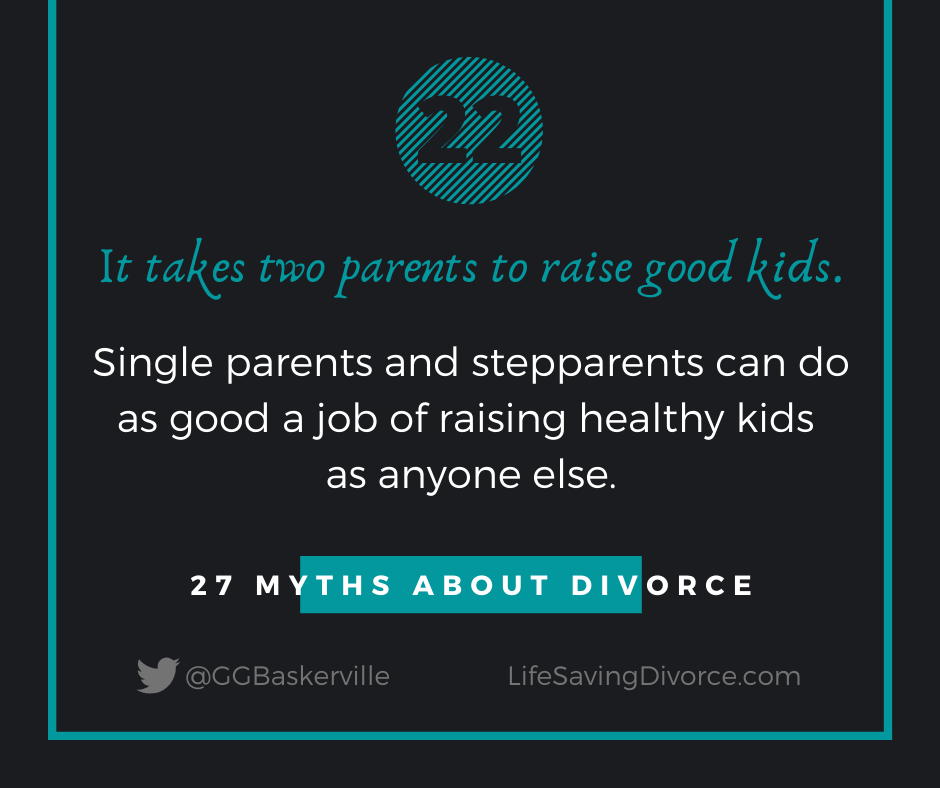
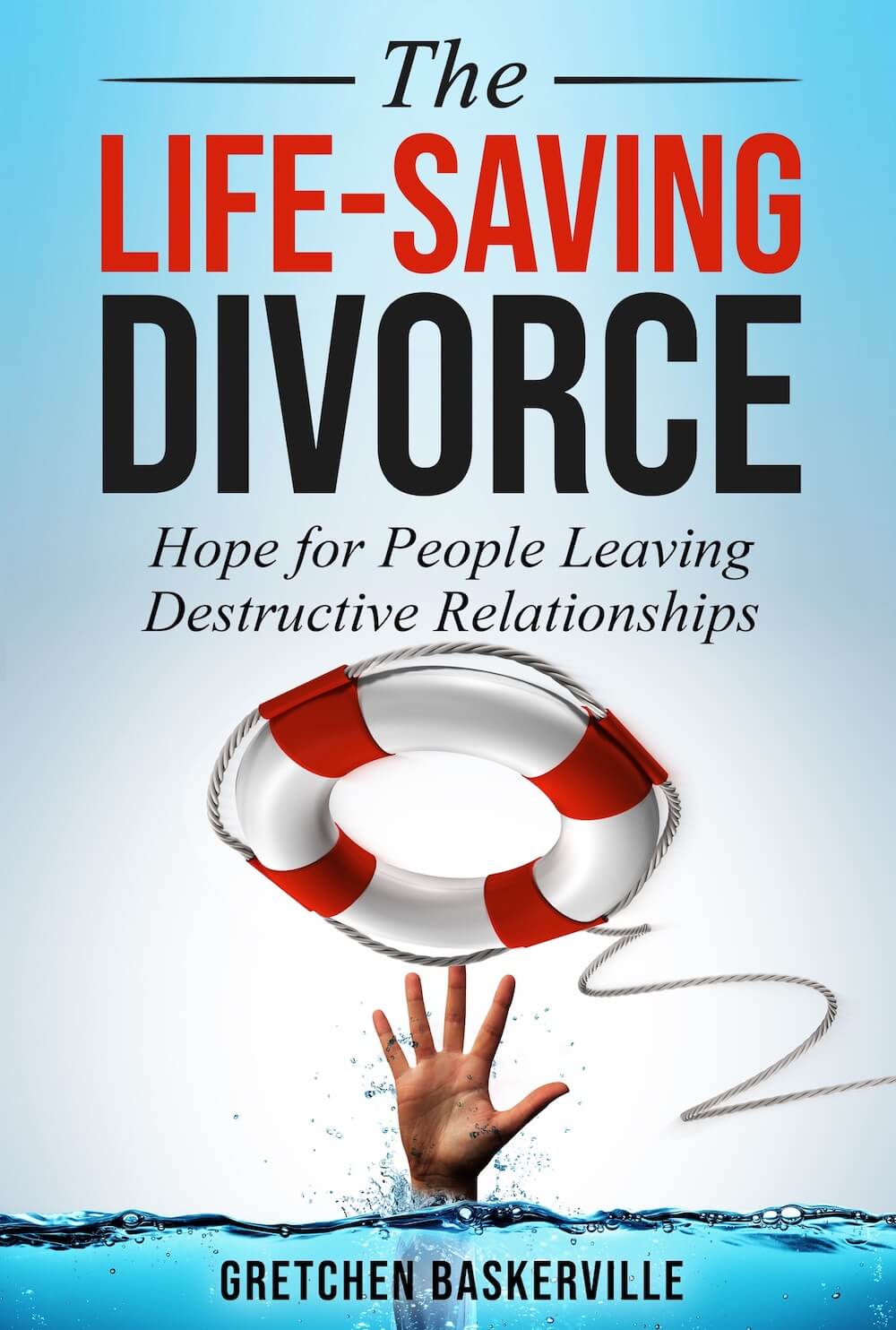
 :
:
 Buy PDF
Buy PDF